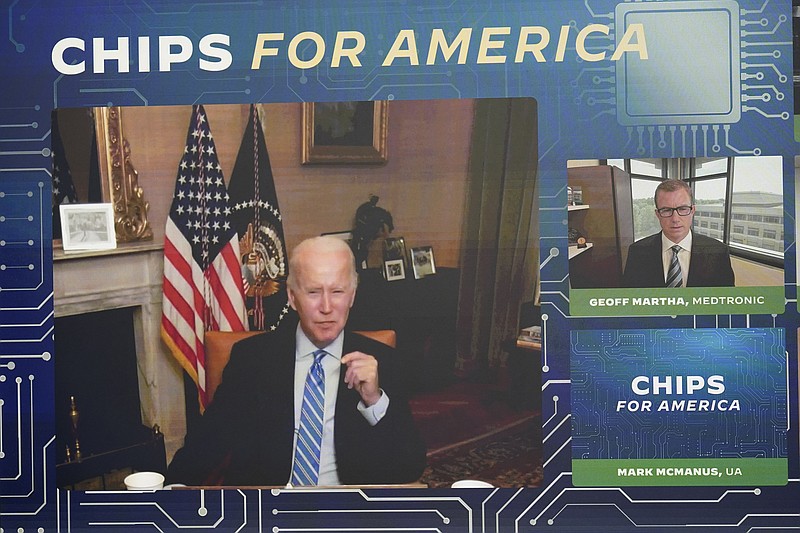The ubiquitous microchip that pervades virtually every aspect of modern life was invented in America, and the United States still dominates the development and design of cutting-edge semiconductors. Yet our capacity to manufacture them has atrophied, leaving us dangerously dependent on Asia for the most sophisticated chips required for our own national defense and economic security. Enter the CHIPS Act, and not a moment too soon.
President Biden last week applauded the Congressional approval of the CHIPS and Science Act of 2022, aimed at expanding domestic semiconductor manufacturing and substantially increasing support for innovation and scientific research to counter the aggressive Chinese bid to dominate this sector. The bill drew bipartisan support with 17 Republican Senators including Minority Leader McConnell voting for the bill along with 24 House Republicans. The basic framework had already been adopted in an even more bipartisan vote in January 2021, but Congress had been unable to adopt a funding formula until last week.
To fully appreciate the urgency of this investment, consider how the U.S. created semiconductors and then stopped building them.
The invention of the transistor in 1947 eliminated bulky vacuum tubes for switching and amplifying electronic signals and permitted increasingly complex circuitry by wiring hundreds of these devices together. In 1959, Texas Instruments and Fairchild Semiconductor succeeded in placing an entire circuit of multiple transistors onto a single block of silicon, creating the first "integrated circuit." In 1962 the Defense Department's Minuteman Missile program became TI's first chip customer, followed by NASA's order to Fairchild for the Apollo space program.
While these early integrated circuits contained a few dozen transistors, the most advanced chips available today hold 50 billion transistors, each up to 15,000 times smaller than a human hair. In 2021, a staggering 1.1 trillion chips were sold worldwide, finding applications in virtually every aspect of modern life. An average car with a gas engine can contain over 1,000 while an electric vehicle uses as many as 3,500 chips.
The U.S. still holds a lead in the design of advanced integrated circuits. However, America's ability to manufacture these critical components has declined to what is now an alarming level. Due to the high cost of construction and operating domestic production facilities (known as foundries or fabs), American companies have adopted a so-called "fabless" model, outsourcing most of the production to dedicated contract foundries like Taiwan's TSMC. Since 1990, manufacturing capacity inside the United States has declined from 37% of global demand in 1990 to just 12% today, while nearly 80% of all chips now come from East Asia including Taiwan, South Korea, Japan and increasingly China. Some of the biggest US tech companies like Apple, Google and Amazon now depend upon Taiwan for up to 90% of their essential electronics.
Of even greater concern is the supply of the most complex cutting-edge chips essential to our national defense. According to a recent analysis by the Boston Consulting Group, 92% of the most advanced microprocessors are manufactured in Taiwan, primarily by TSMC, with the remaining 8% built in South Korea. These highly complex semiconductors are essential for critical defense systems including the F-35 fighter jet, missile guidance systems, and advanced artificial intelligence (AI) applications, yet the US builds none of these vital parts here. Zero.
This level of dependency on foreign suppliers is alarming enough. It becomes existential in light of China's stated intention to gain global leadership in advanced technology including semiconductors by 2030 and its willingness to invest heavily to do so. The vast nation has already gained the lead in some AI applications and produces more research papers, patents, and Ph.D.'s in artificial intelligence than the US and more than twice as many STEM degrees. Now targeting dominance in semiconductors, Beijing is aggressively bankrolling state-owned chip factories while rapidly closing the design gap through coerced technology transfers, massive research funding, and aggressive intellectual property theft.
Yet perhaps even more concerning in the shorter term is the potential for Chinese aggression in Taiwan. Chinese President Xi Jinping has effectively consolidated power into a lifetime presidency and views the recapture of the independent island as an essential element of his legacy. Xi is also aggressively modernizing his military based on the same advanced semiconductor technology as the US with a stated goal of being "fully modern" by 2027. The prospect of Chinese invasion and control of Taiwan's chip assets is surely one of the greatest national security threats facing the US. The Chinese clearly understand the implications. Witness Xi's saber-rattling in response to Speaker Pelosi's Taiwan visit, and China's increasing bellicosity over recent months.
It is very late in the game, but not too late. While still not a match for Chinese largesse, the CHIPS Act represents the most significant federal investment in technology since the Apollo space program, adjusted for inflation. CHIPS allocates $52 billion in direct expenditure and $24 billion in tax credits over 5 years to support construction and expansion of US chip plants and for research in advanced semiconductor manufacturing technology. The act also authorizes $200 billion in future appropriations for basic scientific research into critical technologies that could help the US maintain its tenuous lead in innovation and design.
The question is not one of government versus private investment. America's diminishing primacy in advanced technology and our deficit in manufacturing capability is an existential national security issue, and the CHIPS Act is a big step forward.
Chris Hopkins is a chartered financial analyst and co-founder of Apogee Wealth Partners LLC.
